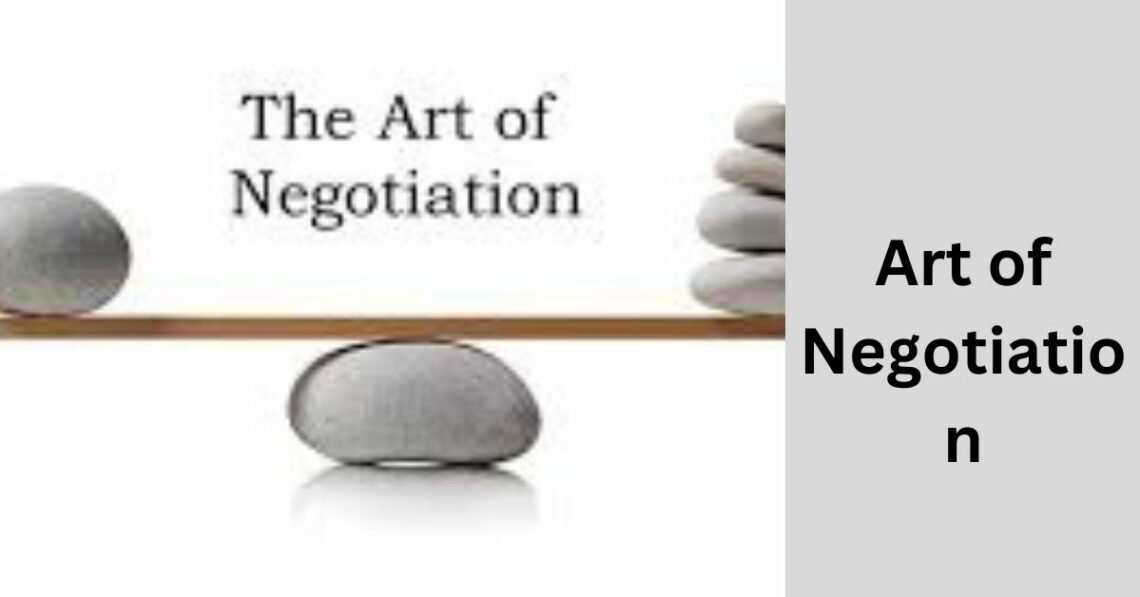
The Art of Negotiation: Navigating the Deal or No Deal Dilemma
In both personal and professional spheres, the concept of “deal or no deal” is a recurring theme that encapsulates the essence of negotiation. Whether you’re discussing a business agreement, a real estate transaction, or even a family decision, the ability to strike a favorable deal requires a unique set of skills.
This article delves into the intricacies of negotiation, exploring the factors that contribute to successful deals and the potential consequences of walking away from an agreement.
The Dynamics of Negotiation:
Negotiation is a dynamic process that involves two or more parties attempting to reach a mutually beneficial agreement. It requires effective communication, strategic thinking, and a deep understanding of the interests and priorities of all involved parties. The negotiation table becomes a battleground of ideas, where each participant strives to secure the best possible outcome for themselves or their organization.
Factors Influencing a Successful Deal:
Preparation:
Before entering into any negotiation, thorough preparation is essential. This involves researching the other party, understanding market conditions, and clearly defining your goals and limits. The more prepared you are, the better equipped you’ll be to navigate the negotiation landscape.
Communication Skills:
Effective communication is the cornerstone of successful negotiations. Being able to articulate your needs, listen actively, and convey your perspective persuasively can tip the scales in your favor. Non-verbal cues and body language also play a crucial role in building rapport and understanding.

Flexibility and Adaptability:
Negotiations rarely go according to plan. Being flexible and adaptable allows you to respond to unexpected developments and find creative solutions to challenges. Rigidity can hinder progress and lead to a breakdown in communication.
Empathy:
Understanding the motivations and concerns of the other party fosters a collaborative atmosphere. Empathy enables you to identify common ground and work towards a solution that satisfies the needs of all involved.
Patience:
Negotiations can be time-consuming, requiring patience and perseverance. Rushed decisions may lead to unfavorable outcomes. It’s crucial to stay focused on the long-term goal and not succumb to impulsive reactions.
The Consequences of No Deal:
While the allure of securing a better deal may be tempting, walking away from negotiations carries its own set of consequences:
Missed Opportunities:
Opting for “no deal” may result in missed opportunities for growth, collaboration, or advancement. It’s essential to weigh the potential benefits against the risks before deciding to walk away.
Damaged Relationships:
Failed negotiations can strain relationships between parties. Building and maintaining positive connections is crucial in various aspects of life, and a failed negotiation can lead to resentment and distrust.
Reputational Impact:
In professional settings, a reputation for being difficult to negotiate with can hinder future opportunities. Word-of-mouth travels fast, and a negative reputation may precede you in subsequent dealings.
Strategic Decision-Making:
One crucial aspect of the negotiation process is strategic decision-making. It involves analyzing the information gathered during the preparation phase and formulating a clear strategy. This strategy should encompass your priorities, fallback positions, and potential concessions. It’s akin to a chess game, where each move is calculated, and the overarching goal is to position yourself advantageously. Strategic decision-making not only involves understanding your own priorities but also predicting the moves of the other party and preparing for various scenarios.
Building Trust and Rapport:
Building trust and rapport during negotiations is a nuanced skill that significantly influences the outcome. Trust is the foundation of any successful negotiation, and establishing it involves not only being trustworthy but also showing trust in the other party. Transparent communication, reliability, and a commitment to finding common ground contribute to trust-building. Rapport, on the other hand, involves creating a positive and amicable atmosphere. Shared experiences, shared goals, and even humor can foster a connection that makes finding a mutually beneficial agreement more likely.
Win-Win Solutions:
The most successful negotiations often culminate in a win-win situation, where both parties feel they have gained value from the deal. Striving for a win-win outcome requires a mindset that goes beyond a zero-sum game. Instead of viewing negotiation as a competition where one side’s gain is the other’s loss, participants seek creative solutions that address the interests and concerns of everyone involved. This collaborative approach not only strengthens the relationship between parties but also increases the likelihood of future successful dealings.
The Role of Emotional Intelligence:
Emotional intelligence plays a significant role in navigating the deal or no deal dilemma. It involves recognizing and managing not only your emotions but also those of the other party. Emotionally intelligent negotiators can empathize with the perspectives of others, defuse tense situations, and maintain composure in high-pressure environments. By understanding the emotional undercurrents of a negotiation, individuals can make informed decisions that contribute to a positive outcome. Emotional intelligence also facilitates effective communication, helping to bridge gaps and build understanding between parties.
Crisis Management and Contingency Planning:
Negotiations don’t always unfold smoothly, and unexpected challenges can arise. Successful negotiators excel in crisis management and contingency planning. They anticipate potential roadblocks and have alternative strategies ready. This proactive approach helps maintain control during difficult situations and demonstrates a level of preparedness that can bolster your position. Crisis management involves staying calm under pressure, quickly assessing the situation, and adapting your strategy to address the new dynamics of the negotiation. By being resilient and agile in the face of challenges, negotiators can salvage deals that might otherwise crumble.
Post-Negotiation Relationship Management:
The end of a negotiation doesn’t mark the end of the relationship between parties. Effective post-negotiation relationship management is crucial for long-term success. This involves following through on commitments made during the negotiation, ensuring that both parties are satisfied with the outcome, and addressing any lingering concerns. A gracious and professional demeanor post-negotiation contributes to a positive perception of you and your organization. Even if the deal wasn’t entirely favorable, maintaining respect and open lines of communication can pave the way for future collaborations. The post-negotiation phase is an opportunity to solidify the relationship, showcase reliability, and potentially lay the groundwork for more advantageous deals in the future.
Conclusion:
The decision between “deal or no deal” demands careful consideration of various factors. Success in negotiation requires a balance of assertiveness and cooperation, a keen understanding of the situation, and the ability to adapt to changing circumstances. Ultimately, the art of negotiation is about creating value for all parties involved, fostering relationships, and achieving outcomes that stand the test of time.
In both personal and professional spheres, the concept of “deal or no deal” is a recurring theme that encapsulates the essence of negotiation. Whether you’re discussing a business agreement, a real estate transaction, or even a family decision, the ability to strike a favorable deal requires a unique set of skills. This article delves into the intricacies of negotiation, exploring the factors that contribute to successful deals and the potential consequences of walking away from an agreement.
The Dynamics of Negotiation:
Negotiation is a dynamic process that involves two or more parties attempting to reach a mutually beneficial agreement. It requires effective communication, strategic thinking, and a deep understanding of the interests and priorities of all involved parties. The negotiation table becomes a battleground of ideas, where each participant strives to secure the best possible outcome for themselves or their organization.
Factors Influencing a Successful Deal:
Preparation:
Before entering into any negotiation, thorough preparation is essential. This involves researching the other party, understanding market conditions, and clearly defining your goals and limits. The more prepared you are, the better equipped you’ll be to navigate the negotiation landscape.
Communication Skills:
Effective communication is the cornerstone of successful negotiations. Being able to articulate your needs, listen actively, and convey your perspective persuasively can tip the scales in your favor. Non-verbal cues and body language also play a crucial role in building rapport and understanding.
Flexibility and Adaptability:
Negotiations rarely go according to plan. Being flexible and adaptable allows you to respond to unexpected developments and find creative solutions to challenges. Rigidity can hinder progress and lead to a breakdown in communication.
Empathy:
Understanding the motivations and concerns of the other party fosters a collaborative atmosphere. Empathy enables you to identify common ground and work towards a solution that satisfies the needs of all involved.
Patience:
Negotiations can be time-consuming, requiring patience and perseverance. Rushed decisions may lead to unfavorable outcomes. It’s crucial to stay focused on the long-term goal and not succumb to impulsive reactions.
The Consequences of No Deal:
While the allure of securing a better deal may be tempting, walking away from negotiations carries its own set of consequences:
Missed Opportunities:
Opting for “no deal” may result in missed opportunities for growth, collaboration, or advancement. It’s essential to weigh the potential benefits against the risks before deciding to walk away.
Damaged Relationships:
Failed negotiations can strain relationships between parties. Building and maintaining positive connections is crucial in various aspects of life, and a failed negotiation can lead to resentment and distrust.
Reputational Impact:
In professional settings, a reputation for being difficult to negotiate with can hinder future opportunities. Word-of-mouth travels fast, and a negative reputation may precede you in subsequent dealings.
Strategic Decision-Making:
One crucial aspect of the negotiation process is strategic decision-making. It involves analyzing the information gathered during the preparation phase and formulating a clear strategy. This strategy should encompass your priorities, fallback positions, and potential concessions.

It’s akin to a chess game, where each move is calculated, and the overarching goal is to position yourself advantageously. Strategic decision-making not only involves understanding your own priorities but also predicting the moves of the other party and preparing for various scenarios.
Building Trust and Rapport:
Building trust and rapport during negotiations is a nuanced skill that significantly influences the outcome. Trust is the foundation of any successful negotiation, and establishing it involves not only being trustworthy but also showing trust in the other party.
Transparent communication, reliability, and a commitment to finding common ground contribute to trust-building. Rapport, on the other hand, involves creating a positive and amicable atmosphere. Shared experiences, shared goals, and even humor can foster a connection that makes finding a mutually beneficial agreement more likely.
Win-Win Solutions:
The most successful negotiations often culminate in a win-win situation, where both parties feel they have gained value from the deal. Striving for a win-win outcome requires a mindset that goes beyond a zero-sum game.
Instead of viewing negotiation as a competition where one side’s gain is the other’s loss, participants seek creative solutions that address the interests and concerns of everyone involved. This collaborative approach not only strengthens the relationship between parties but also increases the likelihood of future successful dealings.
The Role of Emotional Intelligence:
Emotional intelligence plays a significant role in navigating the deal or no deal dilemma. It involves recognizing and managing not only your emotions but also those of the other party.
Emotionally intelligent negotiators can empathize with the perspectives of others, defuse tense situations, and maintain composure in high-pressure environments.
By understanding the emotional undercurrents of a negotiation, individuals can make informed decisions that contribute to a positive outcome. Emotional intelligence also facilitates effective communication, helping to bridge gaps and build understanding between parties.
Crisis Management and Contingency Planning:
Negotiations don’t always unfold smoothly, and unexpected challenges can arise. Successful negotiators excel in crisis management and contingency planning. They anticipate potential roadblocks and have alternative strategies ready.
This proactive approach helps maintain control during difficult situations and demonstrates a level of preparedness that can bolster your position. Crisis management involves staying calm under pressure, quickly assessing the situation, and adapting your strategy to address the new dynamics of the negotiation. By being resilient and agile in the face of challenges, negotiators can salvage deals that might otherwise crumble.
Post-Negotiation Relationship Management:
The end of a negotiation doesn’t mark the end of the relationship between parties. Effective post-negotiation relationship management is crucial for long-term success. This involves following through on commitments made during the negotiation, ensuring that both parties are satisfied with the outcome, and addressing any lingering concerns.
A gracious and professional demeanor post-negotiation contributes to a positive perception of you and your organization. Even if the deal wasn’t entirely favorable, maintaining respect and open lines of communication can pave the way for future collaborations.
The post-negotiation phase is an opportunity to solidify the relationship, showcase reliability, and potentially lay the groundwork for more advantageous deals in the future.
Conclusion:
The decision between “deal or no deal” demands careful consideration of various factors. Success in negotiation requires a balance of assertiveness and cooperation, a keen understanding of the situation, and the ability to adapt to changing circumstances. Ultimately, the art of negotiation is about creating value for all parties involved, fostering relationships, and achieving outcomes that stand the test of time.
You May Also Like

Deciphering “ag2ga31” – The Enigmatic Code
October 14, 2023
Boho Minimalist Neutral Wallpaper iPhone in 2023
September 22, 2023

